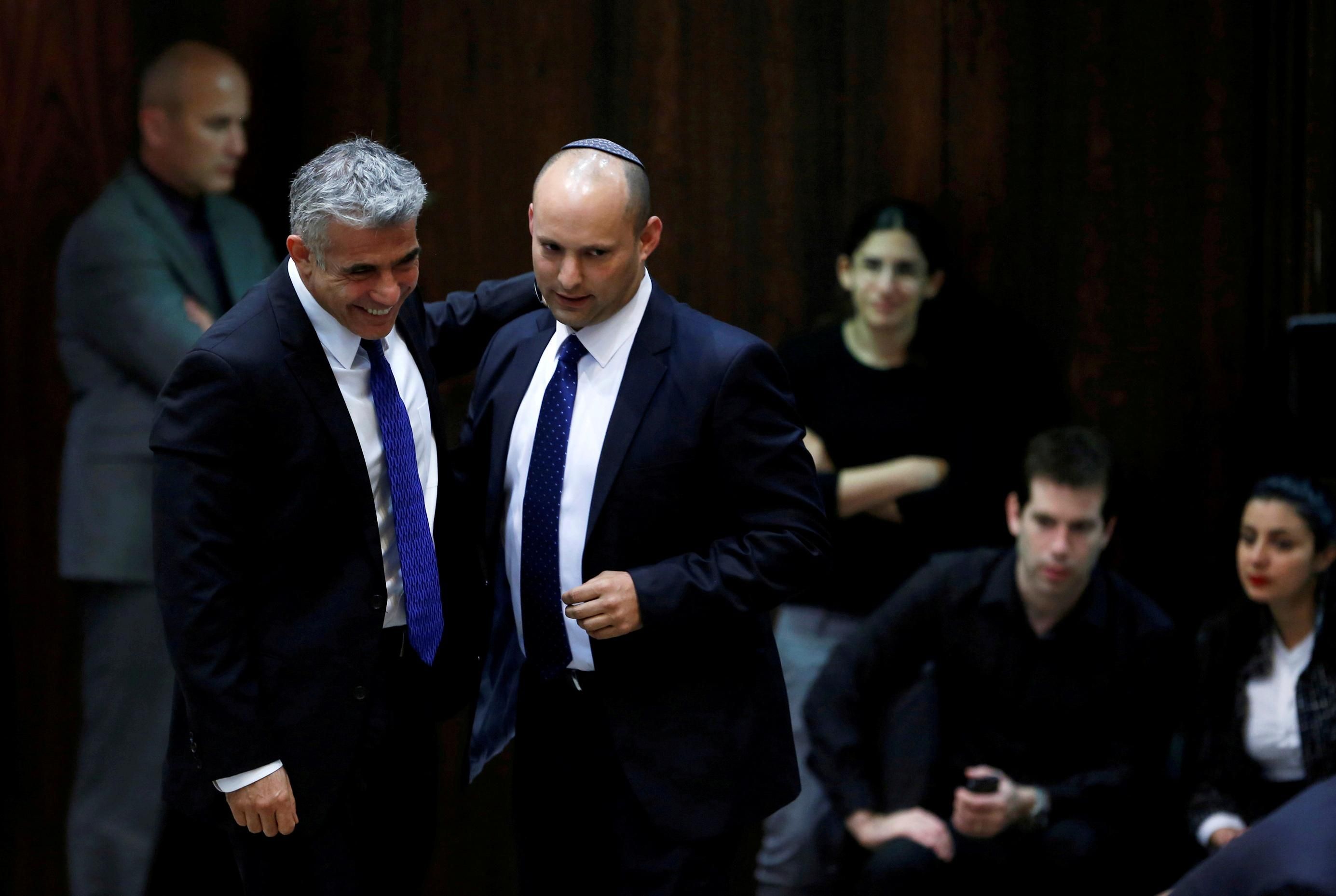After four elections in two years, Israel is finally on the brink of forming a new government. But for the first time in 12 years it won't be headed by someone named Benjamin "Bibi" Netanyahu.
The new power-sharing coalition is likely to be one of the most ideologically-diverse in the country's history. How, after years of dysfunction and deadlock, did we get here, and how might this new government shape Israeli politics and policymaking?
Background. For weeks, Yair Lapid of the centrist Yesh Atid party (There is a Future) has been trying to cobble together enough seats to form a coalition government that would end Prime Minister Netanyahu's long running grip on power.
That process has seen the emergence of a new kingmaker: Naftali Bennett of the rightwing Yamina party (New Right) whose seven Knesset seats Lapid needed in order to reach the 61 seat threshold required to form a government. In order to secure Netanyahu's defeat, Lapid agreed to let Bennett serve as prime minister, while he will head the foreign ministry. Come 2023, they will switch roles, according to the terms of the agreement.
The fractious coalition will now be a ragtag of eight political parties that span the ideological spectrum: it will likely include Raam, an Arab Islamist party focused on boosting funding to Arab-Israeli communities, as well as right and left wing factions. The only thing that truly unites these groups, though, is a desire to sideline Benjamin Netanyahu. Interestingly, some of these politicians, including Bennett, are former Bibi protégés who learnt the ropes from the politically-seasoned incumbent himself.
But so much for what they are all against — what are they for? Once in power, the prospective coalition will face a host of issues that could threaten its survival.
Reforming the judiciary. Netanyahu has long been accused of trying to erode trust in the judicial branch as part of an ongoing effort to scuttle the corruption case he's currently facing. The fact that currently the Attorney General, handpicked by the PM, both advises the government while also overseeing investigations (including the one into Netanyahu himself) has created concerns about a conflict of interest. Gideon Sa'ar, a Likud defector who is likely to head the incoming justice ministry, has been pushing hard for a law that would address this by splitting the Attorney General role in two. However, left-wing parties in the prospective government have reportedly voiced opposition to this reform, saying that politicians should leave the independent judiciary alone. Sa'ar will have to compromise.
Immigration. Tens of thousands of African migrants, mostly from Eritrea and Sudan, have entered Israel over the past decade, making immigration a hot button issue. Yamina's Ayelet Sheked, an anti-immigration hawk and close ally of Bennett, is likely to head the ministry of interior, giving her the immigration portfolio. Shaked, for her part, has previously tried to push the "law against infiltration" — a harsh bill aiming to discourage certain types of migration to Israel. Israel's supreme court has deemed some of these measures unconstitutional.
While Shaked may struggle to get the coalition government's pro-immigration faction — which includes the left-leaning Labor and Meretz parties — to sign-off on her proposal, as head of the interior, she could tighten already-stringent rules on asylum applications. (Haaretz recently reported on Israel's diplomatic ploy to return African migrants to "blood-drenched dictatorships" in Africa.)
Infrastructure and the West Bank. Naftali Bennett is unapologetically pro-settlement, having long-advocated for Israel to annex swathes of the occupied West Bank because of these areas' sizable Jewish populations. The previous Likud government, meanwhile, also put infrastructure plans into motion, including new roads linking settlement blocs to major cities.
However, the transportation ministry is now likely to be led by Labor party chairwoman Merav Michaeli, a darling of the left. Michaeli will try to tweak the ministry's infrastructure priorities to focus on areas outside the West Bank, but her agenda could be hamstrung, at least in part, by the pro-settlement wing of the prospective coalition.
Palestinian issue. Not much is likely to change on this front. Lapid, head of the broad "change camp," is a centrist whose views are squarely within the current Jewish Israeli consensus. Lapid says he supports a two-state solution but opposes division of Jerusalem, which the Palestinians want as the capital of a future state. Settlements are unlikely to expand under this government, as they have done substantially under Netanyahu, but neither are efforts to advance the moribund peace process.
Meanwhile, on the issue of fighting Hamas in the Gaza Strip, most coalition parties — and most Jewish Israelis — are aligned: a poll recently showed that 72 percent of Israelis supported their government's response to the Hamas rocket fire.
What's next for Bibi? When this coalition takes power, Bibi will likely remain leader of Israel's largest political party, and will head the opposition in the Knesset, even as he continues to face corruption charges that could eventually send him to jail. In the meantime, there's no reason to think Bibi won't do everything in his power to undermine the power-sharing government by trying to exploit differences within the ideologically-diverse coalition. If he succeeds, that would precipitate another election that could return him to the PM's seat.
